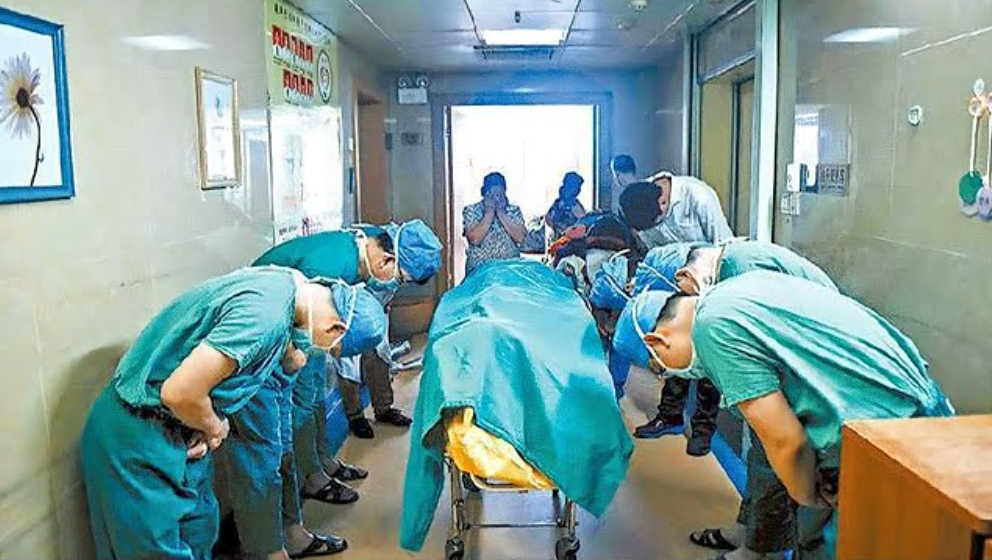
Have you heard the story of the 11-year-old who got the doctors to bow for him? His story is proof of how a singular selfless act can make a huge difference in the lives of others. Liang Yao Yi didn’t live as long as most people do; however, this didn’t stop him from doing something everyone in a country of over 1 billion people adores him for.
This story is set in Shenzhen, South China’s Guangdong Province. It’s about a little boy who, in the year of 2014, got doctors to bow three times for him after his death. A three-time bow was reserved for deities, emperors, or people who did something really honorable. So what warranted such a reaction from the doctors?

Liang, the boy in the story, was like every other little boy in Shenzhen, his little hometown in China. He was born healthy and strong, without any health conditions. He went to school, played games with his mates, and did every other thing boys his age do. Like his mates, he had a dream: he wanted to be an inventor when he grew up. Everything changed when disaster struck. One day, when he was just nine years old, he felt a bit dizzy and told his mother. His mother thought it was just a little fever at first, so she gave him countertop medication in hopes that he’d soon get better.
“When Liang came home that day, we thought it was just a minor illness. So, I got him drugs from the pharmacy. We all expected that he would be fine by the next day or after two to three days. We thought everything was just going to return to normal,” she said. At the hospital, the doctors ran several tests on Liang. And when they got the results, they learned that Liang had a tumor in his brain. Imagine how hard it must have been to tell a little boy and his mother that he had a terminal disease, that he wasn’t going to be able to play around with his peers as much, or go to school regularly due to hospital visits, and that he would have to live with the fear that death was just around the corner, since everyone knew that only a few survived cancer.
Liang and his parents were devastated. The doctor didn’t need to spell it out for them to understand the magnitude of the news. Immediately after the results of the tests were relayed, his parents broke into tears. They cried out their eyes and grew sick with worry. They didn’t want to lose their little baby boy. But Liang was optimistic. He had dreams to achieve, and he couldn’t just die without making a difference. He believed if he was determined enough, he would be able to overcome the disease. The little boy took his medications judiciously and attended school when his health allowed it.
Liang discarded his dreams of being an inventor and decided that being a doctor who was going to help save lives was a better fit for him. A story he read in school about bone marrow transfusion played a big part in the decision he made later. As the days turned into months and the months became years, Liang’s health deteriorated. It became harder and harder for him to go to school.
He grew so weak that he had to spend a major amount of time in the hospital, with several tubes attached to him just to keep him going. Liang tried his best to stay optimistic, but he couldn’t hide the fact that not being able to go to school made him unhappy. So his family tried to keep him occupied during his stay in the hospital. His siblings rotated their visits, and they got him many books to read. He went through each of them within a few days. His parents were not wealthy, so the cost of his treatment took a huge toll on their finances. Besides the financial trouble, it wasn’t easy to watch their loved one go through so much pain. It was a very tough time for the family.
His medical team didn’t relent on their efforts to keep him alive either. They carried out endless researches to ensure his survival, but their efforts proved abortive. Several surgeries were done, and a lot of medication was given, but nothing really made a difference. It was a devastating situation. When he turned 11 years old and there was no significant improvement, it became clear to Liang and his parents that his days on Earth were numbered. However, Liang was determined to make a difference, even if he might not be alive for long. He had learned so much about his condition from books and had gotten an idea of what to do from a story he read in school. Therefore, he made his decision and went ahead to tell.
One day, when his mother came to see him in the hospital, he told his mother his dying wish. The wish was for his organs to be donated to the hospital after his death. He said that he wouldn’t need them once he died, so it would be better for them to give it to someone who needed them to stay alive. “It would be a chance for me to be alive in another way and also help other people. This would be my own way of making someone else happy and making the world a better place,” he said. In his discussion with his mother, he emphasized how important it was for his wish to be granted.
There are many people doing great things in this world. They’re great, and I want to be a great kid too. Even if I might not have much time left, I want to leave a lasting impact. I want this to be my legacy, something that will ensure people don’t forget that I was here. It is no mother’s prayer to have a reason to discuss her own child’s dying wish, but Li Kun could not help but be proud of her son’s selfless decision. With tears in her eyes, she agreed to do as he asked, and that made Liang very happy.
Liang wanted to achieve something great despite being dealt an unlucky hand by life. He believed that he didn’t have to live long to achieve that. He may not have known the magnitude of that decision, but he definitely achieved his wish. In June 2014, after fighting relentlessly, Liang lost his battle with cancer. His parents and siblings were heartbroken. His mother couldn’t believe that he was gone, but she knew what to do to keep his memory alive. Before his death, the doctors had been notified of his intention. They were so surprised that someone so young could make such a decision and promised to make sure his wish was granted.
In China, organ donations were not rampant. The dead were cremated, and people hardly thought to voluntarily donate their organs. It was so hard to get a voluntary blood donor in China. Even though China performs more transplants than any other nation outside of the United States, less than one percent of the population in need of the life-saving surgeries ever receives them.
Although Liang learned about it in school and probably didn’t know the magnitude of his decision, it took a good person to make such a decision. After getting the go-ahead from his mother to extract his organs, the doctors surrounded the 11-year-old, no longer able to help the fifth grader who had someday hoped to be one of them. Then they bowed down three times in tribute. This form of tribute is reserved for deities, emperors, and honorable people.
He certainly deserved it. A few seconds later, they helped grant his wishes. His kidneys and liver were successfully extracted and put to good use. Not all heroes wear capes; some are 11-year-olds with a heart of gold. Liang Yaoyi lives in the hearts of people he donated his organs to. Lee Kun said, “I’m so proud of Liang. My son might have only lived for 11 years, but I feel like he achieved a lot in a short space of time. I know that he won’t be forgotten, and his selfless act will live on forever.”
Liang was very young, but he taught me and his siblings some life lessons that we will never forget. Selfless acts like this should be celebrated, remembered, and discussed constantly. Other people must also learn from what Liang has done and do what they can to make a difference in the world. So what do you think about this organ donation? Share your thoughts in the comment section.




